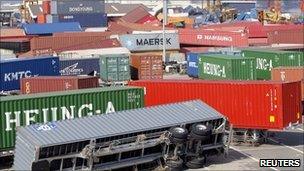Japan quake: Economic impact felt across Asia
- Published
It is almost a week since the deadly tsunami and earthquake hit northeast Japan, and the economic effects are starting to be felt across Asia.
While efforts to deal with the disaster continue, analysts are starting to look at the impact on various sectors and industries.
Some countries that export energy and raw materials could see a surge in demand from Japan.
But others that rely on Japan for manufacturing components will be bracing themselves for shortages in supply.
South Korea
In the short-term, South Korean companies are already benefiting from the shutdown in manufacturing in Japan.
"In terms of semiconductors, auto and steel companies, South Korean and Japanese companies are competitors," said Huh Jae-hwan from Daewoo Securities in Seoul.
"When Japanese companies shutdown factories and cannot produce their products, demand and orders will be on Korean manufacturers," he added.
But the benefits will only continue as long as the situation in Japan does not start to affect the components that Japan supplies to Korean companies.
"IT companies like Samsung Electronics and Hynix keep inventory so they can supply their products as long as the situation doesn't get worse. if it does they could have difficulty getting supply components from Japan," Mr Huh said.
Taiwan
It's a very similar situation in Taiwan.

Some countries rely on goods that would have been shipped through Sendai port
Manufacturers making display panels, semiconductor equipment, cars and their parts could suffer because their raw materials are mostly imported from Japan.
The BBC correspondent in Taipei, Cindy Sui, says Taiwanese chip makers have one-to-two month's worth of supply in their inventory.
If Japanese factories cannot return to normal operation soon, consumers could face shortages and price rises.
Sun Ming-Te, of the Macroeconomic Forecasting Centre in Tapei, said: "If the problem doesn't resolve in a few weeks the majorly impacted companies will be mobile phone producers like HTC, semiconductor companies like TSMC, and the factories built by Japanese automobile companies like Nissan, Toyota and Honda."
He also points out that the tourism industry has already been affected, with many Japanese visitors cancelling trips to Taiwan.
Taiwan gets the second-most tourists from Japan, about one million people a year.
China

Production in South Korea could suffer if there are delays in component shipments from Japan
High-tech electronics and components are important for industry in China and are likely to be affected by the disruption in supply.
The BBC's correspondent in Beijing, Martin Patience, says Japan is China's biggest source of imports accounting for roughly 13% of its purchases from abroad.
Much of what Japan sends to China is assembled into final products which are then exported around the globe.
Stephen Joske, of the Economist Intelligence Unit in Beijing, said: "The price of a Nikon camera has jumped already by 2,000 yuan ($304; £188.50)."
He pointed out that food and vegetable prices, which have already risen significantly in China, could remain high because of demand from Japan.
"China is already experiencing quite heavy food and vegetable inflation in recent months due to bad weather," said Mr Joske.
"What the events in Japan mean is that it will take a bit longer for those prices to come back down again."
Australia
The immediate concern in Japan right now is the extreme power shortages, and the need for alternative sources is immediate.
"Australia is well placed to meet Japan's increased demand for energy products given the significant disruptions to the Fukushima power plant," said Matthew Circosta of Moody's Analytics in Sydney.
Australia is a major exporter of thermal coal and liquefied natural gas (LNG).
"Thermal coal and LNG exports will certainly grow as Japan's energy needs increase," Mr Circosta added.
Over the next few months, as construction and rebuilding begins in Japan, Australia stands to gain further.
Australia exports iron-ore and coking coal which will be in high demand for steel making.
"When you have export benefit, that boost in national income will feed right through the economy," said Mr Circosta.
And while Australian markets have felt some of the volatility seen in the Japanese markets, Mr Circosta says the markets should eventually calm down and reverse their losses.
Indonesia
Indonesia could be another source of energy and raw materials for Japan.
"Indonesian exports to Japan are mainly commodities, iron ore, oil and gas. There will be an increase in demand during reconstruction," said Anton Gunawan of Bank Danamon.
The question is, however, can it boost production quickly.
Eric Sugandi, of Standard Chartered Bank in Jakarta, said: "Indonesia cannot increase oil export abruptly. In fact, domestic production of oil has decreased in recent months because of lack of exploration."
He added that even if Indonesia was able to boost production of LNG, the government has prioritised domestic demand.
India
The impact on India is much more indirect, as Japan is a major source of foreign direct investment into the country.
"Japan is a long-term investor, its sovereign entities have invested in Indian infrastructure such as the Delhi metro and the Delhi-Mumbai corridor," said Ajit Ranade of Aditya Birla Group in Mumbai.
He added that Japan was also a growth sector for Indian IT companies.
"If the Japanese economy suffers, then the long term investment into India could suffer."
- Published18 March 2011
- Published18 March 2011
- Published17 March 2011
- Published17 March 2011